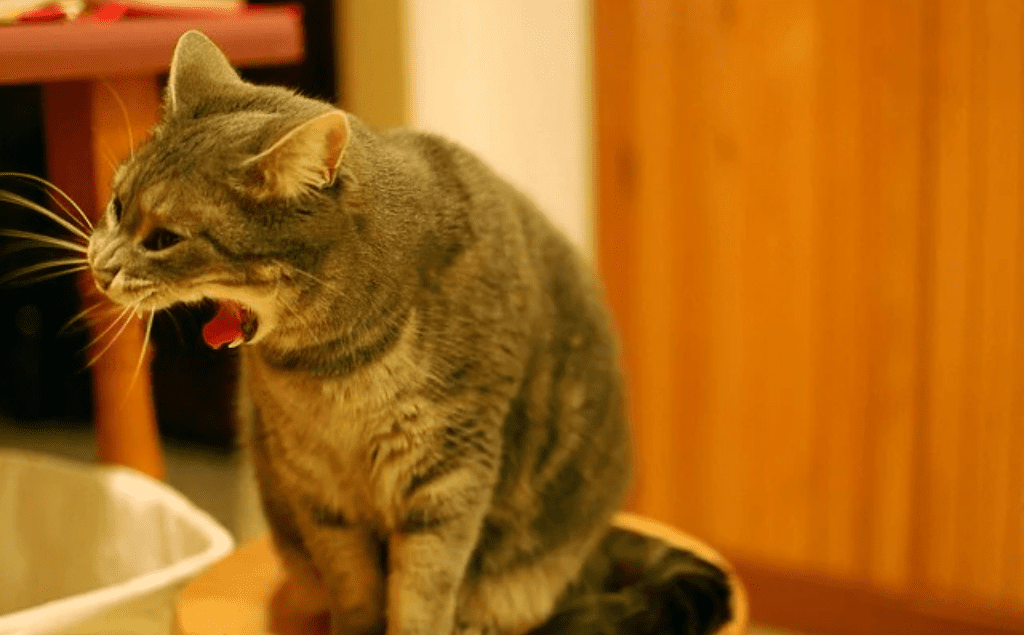When is Cat Gagging Considered an Emergency?
It is not uncommon for cats to gag. They are typically trying to cough up a hairball when they make this noise. When a cat is gagging, they will often crane their neck and start swallowing. They will also widen their mouth, and gagging is often correlated with vomiting.

As a general rule, hairballs are the most common cause of cat gagging. However, your cat could ingest a foreign body, as they are known to do. If gagging does not produce a hairball or increases in severity and frequency, do not take a chance; consider this an emergency. Call and/or go to the emergency vet as soon as possible.
Cats are notorious for swallowing feathers from toys, strings, and all kinds of cat paraphernalia. There can also be other problems that cause gagging, such as heart disease or a respiratory disorder. Read on to find out when cat gagging is normal and when it is an emergency.
9 Causes of Cat Gagging
Cats can start gagging for a variety of different reasons, all of which range in severity. The most important thing to remember is that if you can't identify the exact reason for your cat's gagging, take them to the emergency vet right away.
That being said, there are instances where gagging doesn't need immediate medical care. In actuality, gagging can be a very common behavior for some cats. However, you should still know the difference between causes that do and do not warrant a trip to the emergency vet.
Below are some common causes of cat gagging:
Your Cat's Trying to Get Something Out of Their Throat
Sometimes it is common for a healthy cat to gag. Cats will often gag when there is something stuck in the back of their throat. Gagging is often accompanied by swallowing, craning of the neck, and widening of the mouth.
Your Cat's Trying to Get Rid of a Hairball
Most of the time, hairballs are the cause of their gagging. Hairballs come from your cat grooming themselves, and the hair goes down their throat and into their stomach. Since hairballs are not a natural food that can be broken down, they become unsettled and want to get it out of their stomach.
The hairball is typically vomited up from their stomach. The little ball of hair is full of bile and mucus. Some cats may vomit and become embarrassed by it, so give your cat the space they need to feel secure again.
Your Cat Accidentally Ate Their Food Too Fast
Another common cause associated with cat gagging is if your cat consumes their food too fast or overeats. This rapid ingestion can cause them to feel sick or have their tummy be upset.
If this is the case, you should try feeding your cat less food to prevent them from overeating. You may also need to try having them stick to an eating routine which will help them learn the appropriate eating times each day.
Heart Disease
Cats with heart disease may demonstrate other symptoms. These include coughing, weakness, lethargy, and a swollen abdomen. Cat gagging is also an ubiquitous symptom of heart disease.
Kidney Disease
If your cat is gagging, vomiting, lethargic, and has increased thirst, this may be a sign of kidney disease. It may also be related to a urinary tract infection.
Liver Disease
Cats who suffer from a bloated abdomen, lethargy, discoloration of the skin and eyes, and extreme thirst accompanied by gagging and vomiting may have liver disease.
Nausea
Another cause for cat gagging can be nausea. This can be a symptom of a variety of illnesses or diseases. If your cat is nauseous, chances are they will likely need to gag.
Asthma
This could also incite gagging. If your cat is gagging, breathing with their mouth open, and their gums have turned a different color, get them to the vet right away.
Respiratory Illness
Bronchitis and heartworm-associated respiratory disease can also cause gagging. Your cat could be gagging because mucus is abundant in the throat.
Some instances of cat gagging are not serious, while others require a trip to the vet. If you even need to question it, you should always take your cat to the vet to be on the safe side.
What Should You Do When Your Cat's Gagging is an Emergency?
If your cat is gagging but not throwing up, you should first check the airway. Bring their tongue forward and check to see if anything foreign is there, such as a string or ribbon. Whether you find something irrelevant, you need to get your cat to the vet immediately.
Do not try and pull the foreign object out yourself. The most important thing you can do is get your cat to the emergency vet as soon as possible. They'll be able to figure out the safest way to remove the foreign object from your cat's throat.
It can be frightening to see your fur baby gagging and in distress. You need to keep in mind that gagging can occur for different reasons. Be sure to remain calm in these situations so that you can make the best decisions for your pet.
Contact Emergency Veterinary Care Centers if Your Cat's Gagging
When a cat is gagging, nine times out of ten, they are trying to vomit up a hairball. However, there are other incidences in which your cat will need medical attention. Gagging can also be a cause of an underlying health issue. You should see a veterinarian if gagging persists, as it is up to you as a cat parent to be diligent about making sure they are healthy and happy.
If you have any questions about cat gagging, or if you're experiencing an emergency situation, contact our team at Emergency Veterinary Care Centers right away. Our teams in Highland, Westville and Mishawaka, IN specialize in emergency veterinary care and are here for you and your pet when you need us most. We'll find the cause of your cat's gagging and develop the best course of action for treatment.
Recent Posts
About Us
At Emergency Veterinary Care Centers (EVCC), we know that pet emergencies are unpredictable and often stressful. That's why our team, with over 20 years of emergency and critical care experience, is ready to assist you and your pet in the toughest situations.


